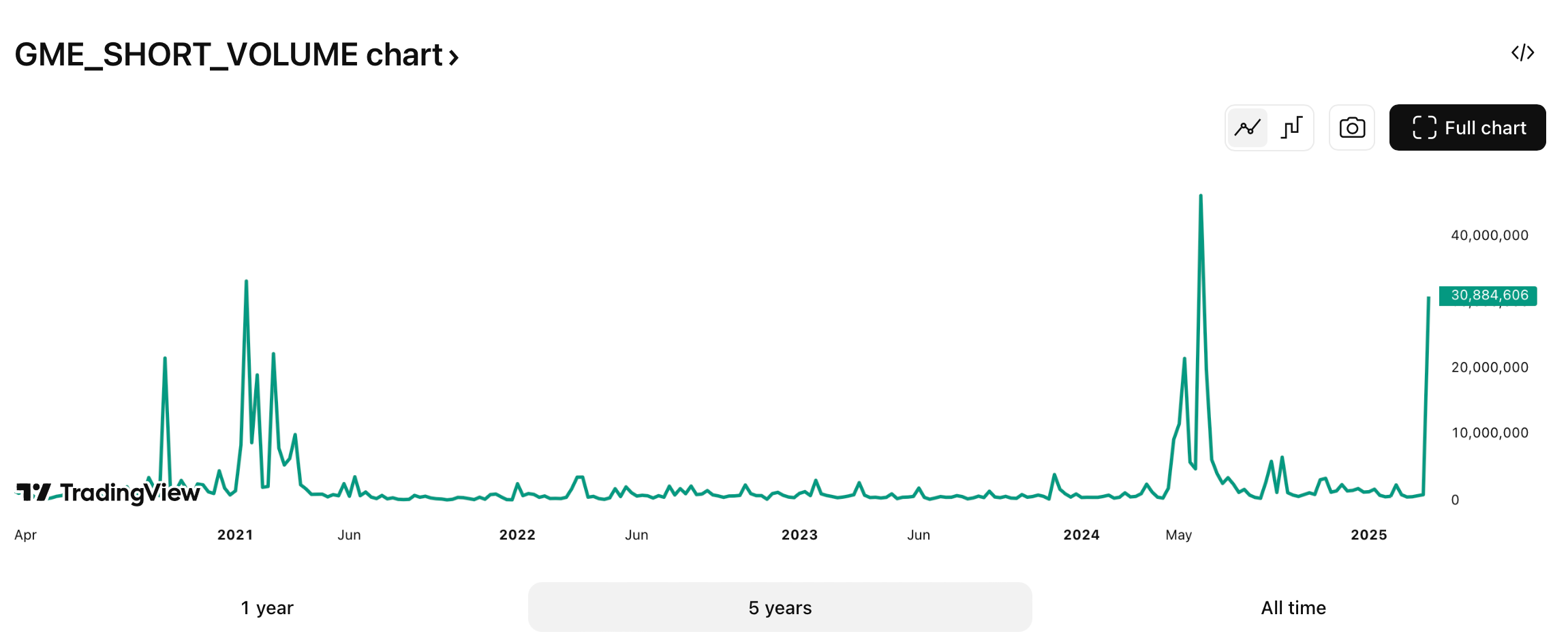
Key Points
- GameStop short sale volume explodes after Bitcoin buzz
- GameStop’s short sale volume hit 30.85M in 24 hours
- NYSE imposes Short Sale Restriction after 22% price drop
- Bitcoin investment strategy sparks skepticism
- Stock trades at $22.09, nearing 2021 short squeeze levels
GameStop short sale volume just hit a nine-month high, shaking Wall Street once again. On March 27, the number of GameStop shares sold short skyrocketed by 234%, totaling 30.85 million in just 24 hours, according to TradingView. The surge triggered a Short Sale Restriction (SSR) on the New York Stock Exchange (NYSE) after the stock plunged more than 10% in a single trading session.
This kind of market behavior is reminiscent of the 2021 GameStop short squeeze, when retail traders banded together to squeeze hedge funds out of billions. Back then, the short volume peaked at 33.26 million shares, and some investors saw life-changing gains. While the current figure isn’t quite at 2021 levels, it’s getting close.

GameStop’s short sale volume reached 30.88 million on March 27. Source: TradingView– Techtoken
The SSR is a regulatory measure that restricts traders from short-selling a stock unless it’s trading at a higher price than the last trade. This measure aims to prevent further downward pressure during a rapid price decline. According to Google Finance, GameStop’s stock tumbled 22% on March 27, dipping below the SSR threshold and ending the day at $22.09.
Kevin Malone, president of Malone Wealth, commented that “GameStop traded 50x more shares today than last Thursday. Not statistically possible without naked short-selling.” Whether that’s true or not, the volume is enough to raise eyebrows.
The event marks another wave in a growing list of surprising market movements across the crypto and Web3 space. From Binance and PancakeSwap launching KiloEx with a 2300% surge to meme coins crashing 57% on Platform Pump.fun’s new revenue sharing model, the market is shifting fast.
$GME SSR Rule is on for tomorrow.
They can still short, but only if the stock moves up before they can short into it.
Smashing the bid over and over is restricted. pic.twitter.com/oVHumcv5XS
— Han Akamatsu 赤松 (@Han_Akamatsu) March 27, 2025
Bitcoin gamble triggers market doubts and deeper sell-off
The GameStop short sale drama didn’t start in a vacuum. It began after the company’s unexpected announcement of a $1.3 billion convertible notes offering, with plans to use some of the proceeds to buy Bitcoin.
While some investors hoped this move could be GameStop’s entry into digital transformation, many were left scratching their heads. The company didn’t say how much Bitcoin it plans to purchase or how it would integrate it into its business model.
Tom Sosnoff, CEO of Tastylive, called the strategy “a little dot-comish,” referencing the early 2000s when companies added “.com” to their names just to boost share prices. “I’m going to buy some Bitcoin with our excess cash because we can’t find a company that is going to be accretive,” Sosnoff said in an interview with Yahoo Finance.
This sentiment is being echoed by other analysts too. eToro’s Bret Kenwell told Reuters that “investors are not necessarily optimistic on the underlying business.” In other words, the Bitcoin announcement felt more like a distraction than a plan.
The convertible notes—which are bonds that can be converted into stock—also raised concerns. This type of financial instrument often leads to hedge fund strategies involving short selling to hedge their positions, which can accelerate a decline in stock prices. Similar to what happened with MicroStrategy in 2021, Han Akamatsu explained that the stock drop is likely due to short hedging rather than fundamental changes.
$GME Let me explain to you why GameStop is falling today, as far as I understand based on my $MSTR experience:
1: When MSTR issued convertible notes, institutional buyers used convertible arbitrage:
•They bought the bonds
•Shorted MSTR stock to hedge
•Waited for the bond to… pic.twitter.com/pj7pbIe4Mv— Han Akamatsu 赤松 (@Han_Akamatsu) March 27, 2025
GameStop is now facing the same market skepticism as others in the crypto world who’ve made aggressive moves. From South Korea’s crypto crackdown on 17 foreign exchanges to CZ’s 125 BNB pay-to-message feature shaking up social engagement, bold moves don’t always equal investor trust.
Historic short volume lingers from Roaring Kitty’s comeback
Even with the massive spike on March 27, the highest recorded GameStop short sale volume remains June 3, 2024, when 46.20 million shares were shorted. That was right after Keith Gill—aka Roaring Kitty—revealed a massive $180 million position in GME, reigniting memories of the 2021 rally.
Gill’s return caused a short-term surge in both retail interest and trading volume. But this time, the sustainability wasn’t there. GameStop has struggled to hold gains and continues to face mounting doubts about its future.
Unlike other high-risk plays in the space, such as Hyperliquid’s painful $1M exploit loss, GameStop’s struggles are more rooted in its outdated business model than external attacks. Yet, it keeps dipping into the crypto narrative—possibly as a last effort to stay relevant.
At this point, it’s clear that short sellers and institutional traders aren’t buying the hype. Whether the Bitcoin purchase pays off in the long term or not, the short-term pain is real—and for now, GameStop’s stock is under serious pressure.
If the crypto markets recover and Bitcoin explodes again, GameStop could find itself back in a more favorable position. But if history is any indication, this ride isn’t for the faint of heart.














